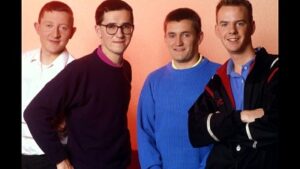Blue Plate Special: The Housemartins
The Housemartins were an English alternative rock group from Hull, active between 1983 and 1988. Initially formed by Paul Heaton and Stan Cullimore, the original lineup included Ted Key on bass and Hugh Whitaker on drums. Key was soon replaced by Norman Cook, who later became internationally known as Fatboy Slim. Drummer David Hemingway replaced Whitaker in 1987, solidifying the band’s final lineup. They were known for their blend of jangly guitar pop and a cappella harmonies, earning a reputation for their distinctive mix of socialist politics and Christian themes, prominently featured in their lyrics.
 The Housemartins quickly gained attention with their sharp, socially-conscious lyrics and catchy melodies. Their breakthrough came in 1986 with the hit single “Happy Hour,” which reached number three on the UK Singles Chart. This success was followed by their debut album, “London 0 Hull 4,” which included the UK number one a cappella cover of “Caravan of Love” originally by Isley-Jasper-Isley. The band continued to enjoy chart success with their second album, “The People Who Grinned Themselves to Death,” featuring singles like “Five Get Over Excited” and “Me and the Farmer.”
The Housemartins quickly gained attention with their sharp, socially-conscious lyrics and catchy melodies. Their breakthrough came in 1986 with the hit single “Happy Hour,” which reached number three on the UK Singles Chart. This success was followed by their debut album, “London 0 Hull 4,” which included the UK number one a cappella cover of “Caravan of Love” originally by Isley-Jasper-Isley. The band continued to enjoy chart success with their second album, “The People Who Grinned Themselves to Death,” featuring singles like “Five Get Over Excited” and “Me and the Farmer.”
When Happy Hour was released during my freshman year at university, the Housemartins quickly became known as “The Happy Smiths,” and over the next 2 years, their two studio albums and 1988’s compilation, “Now That’s What I Call Quite Good” became playlist staples of the dorms and off-campus apartments. Personally, I would add a Housemartins album into the mix any time the mood became too somber after listening to too much of The Cure, The Smiths, and other emotive artists.
Despite their rising popularity, the Housemartins disbanded in 1988. After the breakup, the band members pursued successful careers in music. Paul Heaton and Dave Hemingway went on to form the much more successful (commercially) band The Beautiful South, while Norman Cook found fame as a DJ and producer, creating Beats International and later achieving global success as Fatboy Slim. The Housemartins’ legacy endures through their influential music and the subsequent successes of their members, marking them as a significant presence in the 1980s indie rock scene.
Here are some of my favorites from their brief catalog:
Happy Hour – from the album London 0 Hull 4 (1986)
The People Who Grinned Themselves To Death – from the album The People Who Grinned Themselves To Death (1987)
Reverends Revenge – from the album London 0 Hull 4 (1986)
There Is Always Something There to Remind Me – from the compilation Now That’s What I Call Quite Good (1988)
Me And The Farmer – from the album The People Who Grinned Themselves To Death (1987)
Think For A Minute – from the album London 0 Hull 4 (1986)
Bow Down – from the album The People Who Grinned Themselves To Death (1987)
Caravan of Love – from the non-album single Caravan of Love (1986)




